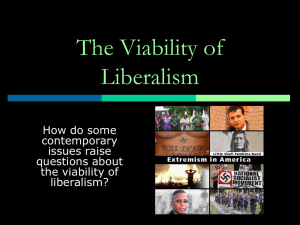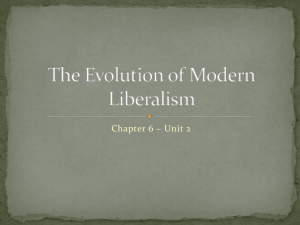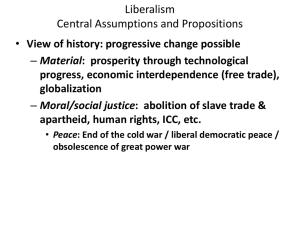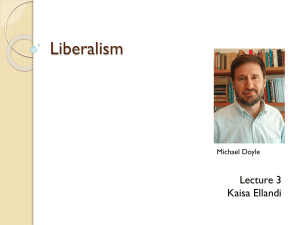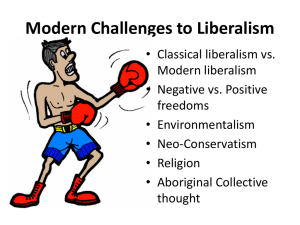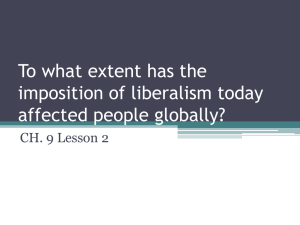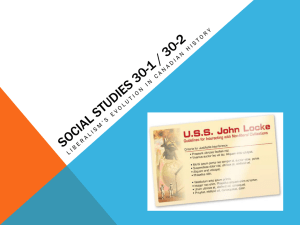nature of the act
advertisement
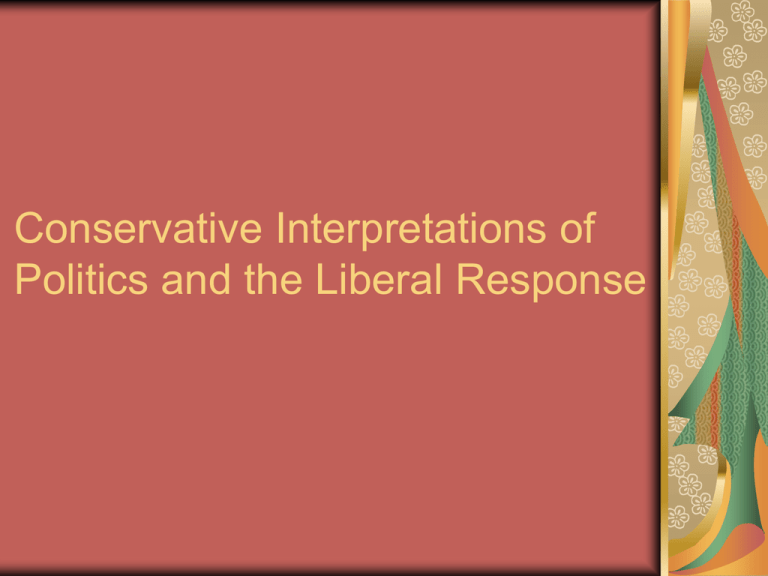
Conservative Interpretations of Politics and the Liberal Response I. Traditional Conservatism A. Principles Naturalism – What is natural is taken to be good. Example: Both Plato and Aristotle tried to show that virtue as they understood it was natural, not just a product of human imagination. Vices were condemned as “unnatural.” 2. Normative Functionalism – Everything is taken to have a single proper purpose. Example: Aristotle described slavery as serving the purpose of reason ruling over those without it. 1. 3. Virtue Ethics Defines good acts in terms of what a good actor would do. The goal is not to identify justice in particular situations, but to develop the character trait of being a just person. Example: Plato said that justice consists of reason allying with the spirit to rule over the appetites. Social justice is the reasoned element (philosophers) ruling over the spirited element (courageous soldiers) to rule the appetitive element (the rabble). 4. Hierarchy Inequality is viewed as the normal state of affairs, requiring those who are more virtuous to rule over the less virtuous. Democracy is thus inappropriate for societies in which the majority is not virtuous. Example: Burke describes English aristocracy as having “inherited” wisdom through many years of governance, giving them some authority. 5. Incrementalism / Stability If change is thought to be desirable, then it should be implemented one step at a time. Revolutions are seldom justified. (Burke makes an exception for “restoring” revolutions) Example: Aristotle’s Politics contains a chapter on how to make tyrannies more stable (incremental reform) 6. Faith-Based Revelation Emphasized much more by some traditionalist conservatives than others Burke argued that ignoring everything but reason led to abstractions removed from the real world. Modern Evangelical conservatives place much more emphasis on this than incrementalism B. Liberal Responses Early liberals attacked every one of these principles (although not all liberals attacked all of them) Naturalism was opposed by Progress Normative Functionalism was opposed by Utility Virtue Ethics was opposed by Act-Based Morality Hierarchy was opposed by Egalitarianism Incrementalism / Stability were opposed by Reform and elite-led Revolution Faith-Based Revelation was opposed by Rationalism II. Statist Conservatism (aka Law and Order, Realism) A. Principles Human Nature – People’s natural state is to be selfish egoists. Example: “State of nature” theory of Hobbes argues that natural life is “nasty, solitary, poor, brutish, and short.” 2. Hierarchy – Only a strong state can protect people from each other and from outsiders. Machiavelli urged leaders to forget about “virtue” if it impeded the welfare of the “patria” 1. 3. Individualism Autonomous individuals make decisions. Individuals may have natural rights, but these rights are not realizable in practice. We must limit some rights to preserve the most fundamental right of all – life. Example: The “social contract” theory of Hobbes stated that individuals surrender every other right when they make a polity. B. Differences from Traditionalism Naturalism is abandoned Revelation is downplayed in favor of Reason. Individuals, not groups, become the unit of analysis. The concept of rights is incorporated into the analysis, providing a reason to support statist/realist solutions Virtue-based ethics is abandoned in favor of consequentialist ethics C. Similarities to Traditionalism Both emphasize the importance of hierarchy for controlling unwanted behavior, although statism tended towards absolutism while traditionalism tended towards constitutional monarchies or limited Republics Both emphasize stability as very important (traditionalism) or the most important end of government (statism). D. Liberal Responses In many ways, statism was closer to liberalism than to traditional conservatism. Liberals agreed with Individual rights A government capable of protecting those rights Basing arguments on reason rather than revelation D. Liberal Responses (cont.) But: Human nature was seen as containing both good and bad elements, and education could develop the good ones even “human nature” is not natural but learned (Rousseau) Hierarchy was seen as corrupting, requiring checks on the state Rights were viewed much more broadly (including speech and conscience) III. Conservative Libertarianism: A Reaction to Statism Sometimes referred to as “propertarianism” because property rights are privileged over all other rights. Example: Locke sees the right to life as being justified by the fact that we own ourselves, opposing slavery for the same reason. So close to liberalism that it is often referred to as “classical liberalism” A. Principles 1. Human Nature: The same basic understanding as statist conservatives humans are selfish egoists and always will be. Seeks to harness egoism. Example: Locke’s support for capitalism and opposition to communal (tribal) landowning 2. Individual Rights Natural rights, including life, liberty, and property, are paramount Individualism over collectivism: rejection of any normative standing for big government, tribes, organized religion, etc. Note that pre-1789 libertarian views had little to say about the emergence of monopolies or unions B. Differences from Traditionalism Essentially everything: Conservative libertarians accept natural inequality, but substitute meritocracy for hierarchy as a response Propertarianism violates traditional values – i.e. commerce is praised rather than viewed as a necessary evil Revolution is quite acceptable as a remedy for rights violations. No incrementalism here! C. What Makes Conservative Libertarians Conservative? All three variants of conservatism take some form of inequality to be normal (if not natural) and desirable All three variants oppose liberalism, particularly its emphasis on egalitarianism All three variants rely on “natural law” and the idea that most people are egoists V. Key Problems for post-1789 political theory A. The problem of act-based ethical standards 1. 2. Traditionalists accept agent-based moral theories (virtue ethics), but what do these have to tell us about specific policies? Most modern political theorists – both Conservative (statist realists, libertarians) and Liberal -- accept act-based moral theories. But these theories were poorly-developed during the Enlightenment. How do we know if an act is right or wrong, without resorting to traditional virtues? 3. Moral inconsistency before 1789 Example: Hobbes on honoring the social contract Hobbes says breaking it leads to anarchy, which is a practical death sentence (consequences determine morality) Hobbes also says that breaking a contract is a form of contradiction, and therefore irrational (nature of the act determines morality) Problem: What should we do if contradiction (lying, breaking a contract, etc) leads to good consequences? Which standard is more important? Problem is common: Plato/Aristotle say virtue is good in itself, good for you, and good for society. What if one of these statements is false but the others are true? How should one choose? 4. Why do we care? Most interesting political disputes involve conflicts between values: liberty vs. equality, good ends vs. unpleasant means, good intentions vs. bad consequences, etc. Examples Should we torture suspected terrorists to extract information? Should we threaten to destroy cities full of innocent civilians in order to protect our own innocent civilians? Should we execute people if doing so fails to deter crime? Should we respect property rights if property owners want to discriminate against other races? Is it OK for the US government to lie to its citizens about whether it is testing biological weapons? If gays want to marry, how to we know how to respond? B. Paradoxes of liberalism 1. Basic assumptions of liberalism a. b. c. d. e. Rationalism: The world can be comprehended through the use of reason, as opposed to revelation, intuition, or authority Teleology: History moves in a progressive fashion – new is usually better than old and natural is not necessarily good. Rejects myths of a “golden age” Individual Autonomy: People have autonomous wills and are capable of rational choice to fulfill their preferences. Implies that society should be structured on the basis of mutual respect for some fundamental list of rights, to include being treated as rational, autonomous, and equal individuals Egalitarianism: People have equal worth and more or less equal basic abilities. Implies that any inequality we observe must be the result of policy or choice, not natural hierarchy Pluralism: Society is best served by having multiple, competing points of view (the marketplace of ideas) and multiple ways of living 2. Opposing tendencies in liberalism a. Paradox of liberal democracy: Natural equality of autonomous individuals means we all have equal rights, so a majority cannot justly be ruled by a minority. BUT what if the majority wishes to violate the rights of a minority? b. Paradox of Pluralism If having multiple views is necessary and good, then how can liberalism claim to be the best political viewpoint? If everyone was liberal wouldn’t that destroy pluralism? How should liberals react to nonliberals who don’t share the ideal of pluralism? Limiting their speech or political participation would be antiliberal. c. Paradox of Egalitarianism Society is characterized by hierarchy and inequality. According to liberal assumptions of egalitarianism, this is neither “natural” nor desirable. But what if inequality is produced by rational human choices? Efforts to limit inequality would limit individual autonomy (rights) and pluralism. d. Paradox of Cosmopolitanism Since all people are worthy of equal respect, we must treat all people as equal, but this raises a contradiction: A one-world government where everyone enjoys equal rights may fail to respect people with patriotic (nationalist) views or destroy pluralism. But the present division of the world into nation-states must violate autonomy or egalitarianism – either by governing citizens in the interest of non-citizens or by treating citizens and non-citizens differently. 3. Unanswered Questions a. Are political rights more deserving of protection than property rights? b. Does the greatest danger to liberty come from government power or discrimination by our fellow citizens? c. How can democratic self-government be reconciled with the rights of economic, racial, or religious minorities? d. Does a community owe duties to individuals? How might social welfare be justified? e. Should government work to ensure equal opportunities – and not merely equal rights -- for all citizens?

